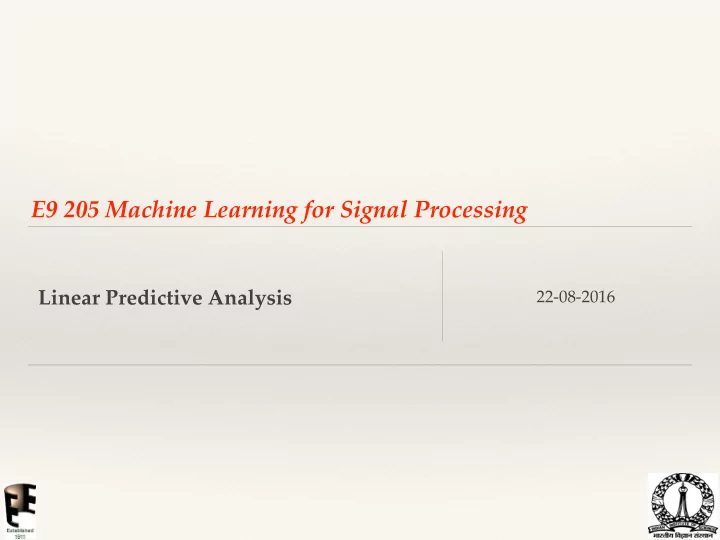

E9 205 Machine Learning for Signal Processing Linear Predictive Analysis 22-08-2016
Linear Prediction ❖ Current sample expressed as a linear combination of past samples n- 3 n- 2 n- 1 n a 1 a 2 a 3
Properties of LP Error signal (for the optimal predictor) is orthogonal to the samples used in the predictor. Using the orthogonality property -> normal equations Autocorrelation matrix is Hermitian symmetric.
Properties of LP Forward linear prediction filter Properties of - stability (all roots ) except for line spectral process
Properties of LP AR(N) process - Any WSS process which satisfies Filter is stable - error signal is white Approximating by i.e. with
Properties of LP AR(N) process - Any WSS process which satisfies Filter is stable - error signal is white Approximating by i.e. with Autoregressive modeling
Properties of LP
Properties of LP
Properties of LP
Linear Prediction AR Model of the Power Spectrum of the Signal
Applications of Autoregressive Modeling ❖ Economics - Macroeconomic variabilities ❖ Statistics - System Identification. ❖ Geophysics - Oil Exploration. ❖ Neurophysics - EEG signal analysis (rhythms) ❖ Speech Communication - Coding, Recognition.
Linear Prediction for Speech
Source Filter Model of Speech
Feature Extraction for Speech/Audio Conversion to Spectrogram Frequency Frequency Time
Feature Extraction for Speech/Audio Integration to Mel-scale Frequency Time
Feature Extraction for Speech/Audio Integration to Mel-scale Mel Frequency Time
Feature Extraction for Speech/Audio Integration to Mel-scale Frequency Log + DCT Time
Feature Extraction for Speech/Audio Conversion to features - Mel frequency cepstral coefficients (MFCC) Frequency Time
Recap so far … ❖ Signal analysis - STFT ❖ Choice of suitable window, time frequency resolution. ❖ STFT factorization ❖ NMF - cost function, auxiliary function, divergence, applications in speech/audio. ❖ Signal Analysis - linear prediction ❖ Orthogonality of error, normal equations, approximation with AR(N) process, autoregressive modeling.
Face Images (Assignment) Normal Lighting Conditions Occlusion
Recommend
More recommend